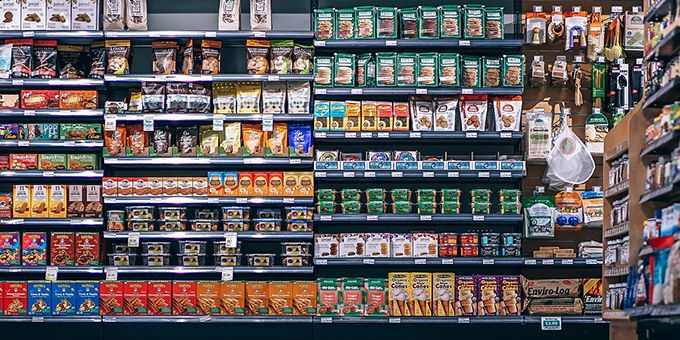The future of food packaging seems to be leaning towards sustainability. This shift comes after years of growing influences from a variety of sources. But to fully understand where the industry is going, it helps to know how it got here.
 The Future of Food Packaging Is Sustainability
The Future of Food Packaging Is Sustainability

Scott Huntington | Off The Throttle
The food packaging industry has gone through some considerable changes over the years. As the demands of the global food trade grew and shifted, so have the packages that hold food products. The industry is in the middle of another such shift today.
The future of food packaging seems to be leaning towards sustainability. This shift comes after years of growing influences from a variety of sources. But to fully understand where the industry is going, it helps to know how it got here.
Trends in food packaging tend to come from changing needs. The whole concept of food packaging likely came about when people started selling and storing foodstuffs more frequently. Similarly, the need for longer shelf lives led to the development of canning.
Like trends in the past, food packaging today is shifting out of necessity. Although the design and structure of packages has come a long way in the last few decades, one thing remains persistent. The materials we use to package food haven't all caught up to our changing needs yet.
The State of Food Packaging Today
If you go to the grocery store and look through the aisles, you'll notice a trend among containers. It seems like almost everything you find is plastic. You can find plenty of examples of cardboard and metal too, but plastics are everywhere.
This trend isn't anything new, of course. Plastic packaging has been around since the 1950s and effectively took over in the '80s and '90s. Today, with more varieties of plastics available, you can find them holding just about everything.
From resealable snack containers to fish and seafood packaging, you can find plastic containers in every area. You'll also notice another trend among all of the food packages, whether or not they're made from plastic. The vast majority of food containers are single-use products.
When you eat or use all of the food in a package, you probably throw away the container. Food packaging today is cheap and disposable, which is great for saving money, but it raises a few issues. The convenience of disposable plastics comes at a price.
Today's containers are made for you to throw them away almost immediately. This design leads to piles of used plastics building up across the world, and it all has to go somewhere. More often than not, it ends up in a landfill or the ocean, causing environmental harm.
The Need for Sustainable Packaging
You're probably already aware that plastics aren't good for the environment. But the extent of their ecological impact may be more severe than you think. Just one plastic bottle can take 450 years to decompose, and we dump a lot of them into the environment.
The food packaging industry isn't the sole source of plastic pollution, but it is a substantial one. Food packaging is often the second most common type of trash in beach cleanup operations. If food containers are just 10% of the plastic that ends up in the ocean, that's still one million tons of waste.
As environmental issues become more urgent, the general public pushes towards sustainability. People are becoming more environmentally conscious, which means they're making more sustainability-minded purchases. As a result, the food packaging industry is seeing a shift in the preferences of its consumers.
According to a 2019 survey, 64% of consumers in the U.S. and U.K. stated that recyclable packaging was important to them. Just over half of them said the same about reusable packaging, and 39% also mentioned biodegradable packages.
The industry needs to pursue sustainability for two main reasons. First, and most importantly, sustainable packaging will help lessen the industry's less-than-ideal environmental impact. Second, introducing more sustainable packaging options will appeal more to customers.
Approaches to Improve Sustainability
The need for sustainable food packaging has already started inspiring change in the industry. Single-use plastics still dominate the market, but they're slowly diminishing. Various companies are beginning to take different measures to improve the sustainability of their packaging.
When you think of eco-friendly packaging, you probably imagine people using biodegradable or recyclable materials. This approach is the most obvious and one of the most popular. After all, entirely replacing plastics will definitely reduce the amount of plastic waste a company produces.
Eco-Products — a green food packaging manufacturer — recently introduced a compostable tray for meats and produce. While most traditional trays are either plastic or styrofoam, Eco-Products makes these out of sugarcane. They're microwavable, resilient and, most importantly, biodegradable.
An alternative to replacing plastics is recycling them. Using recycled materials is ideal not just because it's more sustainable, but because it's more economical as well. Instead of having to buy new materials, manufacturers only have to cover the cost of recycling old ones.
Recycled packaging also comes with no noticeable changes for the consumer. You probably won't be able to tell the difference in the look and feel between a recycled plastic container and a brand-new one. Consumers can keep using packages they're familiar with while lessening their environmental impact.
Another option, and probably the simplest, is to use less packaging. With less plastic in each container, the environmental cost of each piece of trash isn't as substantial. Using less material will, like recycling, save manufacturers money as well.
Food Packaging in a Changing World
The food packaging industry's turn towards sustainability isn't a trend among a few small companies. It's an industry-wide shift with most, if not all, of the world's major packaging manufacturers taking a stronger environmental stance. In a few years, single-use plastic packaging may be a thing of the past.
As stronger regulations for environmentally-harmful materials emerge, food packaging companies will pursue sustainability further. But this isn't a coming trend. It's happening right now across the globe.
Already, 93% of packaged goods companies say they're spending more time on environmental issues than in past years. You can find evidence of this shift just by going to the grocery store now. You'll still find a lot of plastics, but you'll also find more recycled or biodegradable packaging.
The world is experiencing a widespread shift towards sustainability in all sectors. As environmental issues become more important to consumers, more companies will take them seriously. The food packaging industry is changing, and it's changing for the better.
The content & opinions in this article are the author’s and do not necessarily represent the views of ManufacturingTomorrow
Comments (1)
Featured Product

